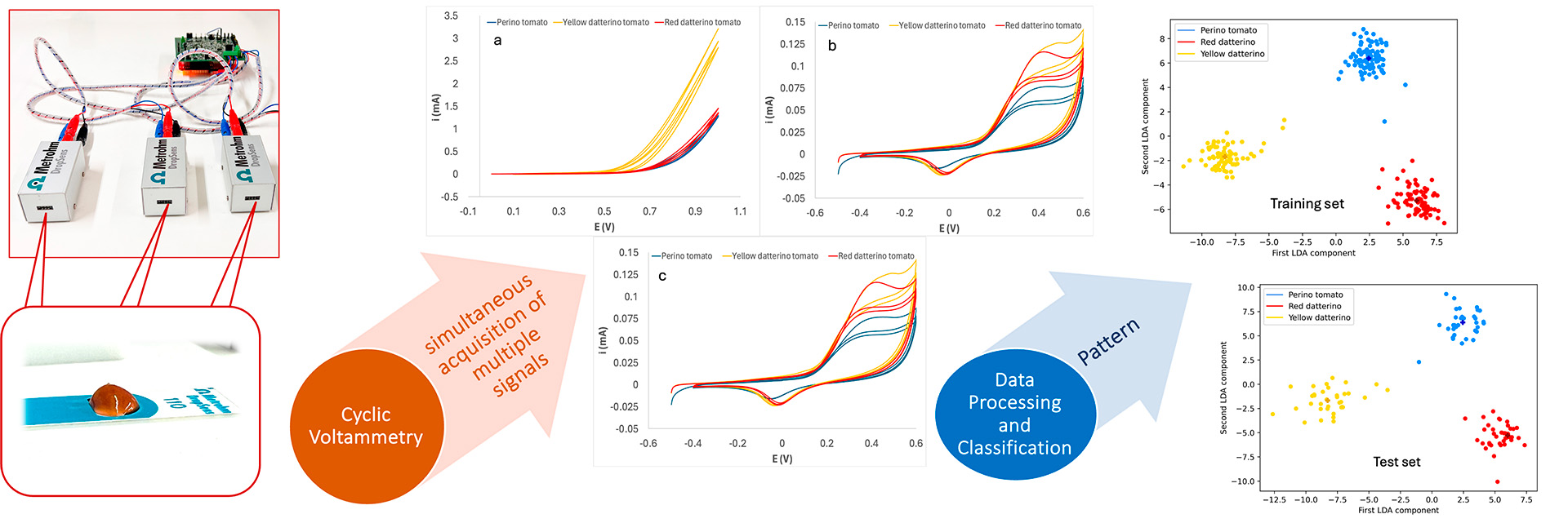Strengthening of the Italian Research Infrastructure for Metrology and Open Access Data in support to the Agrifood
Important Achievement of the METROFOOD-IT Project: An Article on the E-Tongue Developed by UniParma for the Classification of Tomatoes of Different Cultivars Published in the Journal “Sensors”
The University of Parma has achieved a significant scientific milestone within the METROFOOD-IT project: an article on the development and performance evaluation of a voltammetric electronic tongue (E-Tongue) for the classification of tomato purées based on the cultivar of the raw material has recently been published in the journal Sensors (MDPI). The publication appeared in the context of a Special Issue entitled "Low-Cost Chemosensors for Applications in Environment, Health, Food, and Industry Process Control" and is available in open access, allowing full public sharing.
The study in question (“Evaluation of a Voltammetric E-Tongue Combined with Data Preprocessing for Fast and Effective Machine Learning-Based Classification of Tomato Purées by Cultivar”) was carried out within the activities of the METROFOOD-IT project, utilizing the acquired facilities, and includes among its authors the Project Leader Prof. Maria Careri, Prof. Ilaria De Munari, Prof. Stefano Cagnoni, Prof. Marco Giannetto, and other researchers affiliated with the project. The result was achieved thanks to the synergy between the UNIPR1 – Smart Analytical Sensors Unit and UNIPR2 – Computer Engineering and Electronic Sensors Unit.
More specifically, the research groups in Analytical Chemistry, Electronic Engineering, and Information Engineering at the University of Parma developed an electrochemical electronic tongue based on the combination of three sensors implemented on screen-printed electrodes modified with composite nanomaterials for the authentication control of food products.
The potential of the E-Tongue, combined with data preprocessing aimed at optimizing the performance of multivariate Machine Learning techniques, was successfully applied to the rapid discrimination of tomato purée samples obtained from cultivars of different commercial value. It was thus possible to differentiate the three tomato varieties (red cherry, yellow cherry, and plum) based on responses related to the concentration of sugars and antioxidants.
A very interesting result is the extreme speed of the analysis: the developed electronic tongue allows simultaneous analysis of up to eight samples in less than a minute.
Moreover, the processing of analytical data using Machine Learning techniques for sample classification is noteworthy. Among these, Linear Discriminant Analysis proved particularly effective, providing an average correct classification score of over 99%. The development of algorithms and statistical models for data preprocessing proved advantageous for reducing data dimensionality and, consequently, computational cost, facilitating future hardware implementation.
This innovative study is significant for the design of hardware solutions to be integrated into low-cost portable devices for future applications in the field of food product authenticity and adulteration detection.
The article published in Sensors can be downloaded at this link: https://www.mdpi.com/1424-8220/24/11/3586






